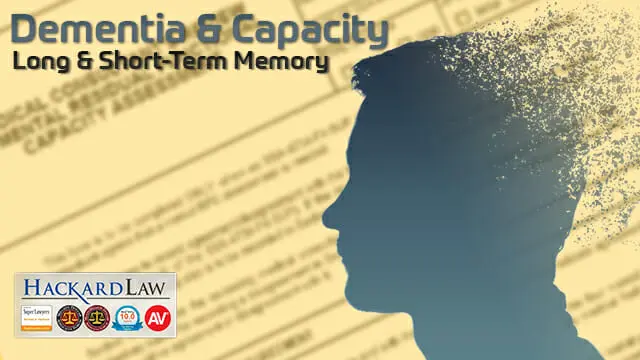
Dementia & Capacity | Long-Term & Short-Term Memory
The existence and influence of dementia is often a pivotal fact in estate and trust litigation. The effects of dementia on a testator (the maker of a will) or settlor (the maker of a trust) will be scrutinized in different ways.
In wills a court must determine whether the will maker had capacity to:
(1) understand the nature of the testamentary act,
(2) understand and recollect the nature and situation of his or her property, and
(3) remember and understand his or her relations to immediate family members and those whose interests are affected by the Will.
Determining capacity in trusts sets a higher capacity standard. Finding capacity for a settlor requires that the individual be able to communicate, understand and appreciate:
(1) the rights, duties and responsibilities created or affected by his or her decision,
(2) the probable consequences of the decision, and
(3) the significant risks of, benefits of, and reasonable alternatives to the decision.
Elders in steep cognitive decline are targets of choice for the unscrupulous – Those who unduly influence an elder suffering with Alzheimer’s or dementia to make radical changes in estates or trusts benefitting the undue influencer.
One important distinction that I’ve noticed in handling dementia-related cases is the difference between long-term memory loss and short-term memory loss. In many instances, a senior with dementia may recall events from the distant past with ease – where they grew up, their childhood, old friends and acquaintances. At the same time, their short-term memory can still suffer.
Not too long ago I spoke with a friend assisting a dementia patient. She was bright, happy and seemingly aware of her surroundings. But she also thought she was sitting in the schoolhouse where she had studied eight decades ago, and the pony that she long ago rode to school was outside waiting for her. Needless to say, this elderly lady didn’t have the capacity to make estate decisions.
If you have a concern about dementia or Alzheimer’s and a recently changed estate or trust, you can call us at Hackard Law: 916-313-3030. We represent beneficiaries throughout California, including in Los Angeles, Alameda, Sacramento and Santa Clara.
We’re dedicated to protecting client interests, and we’ll be glad to see how we can help you.

 (916) 775-8542
(916) 775-8542